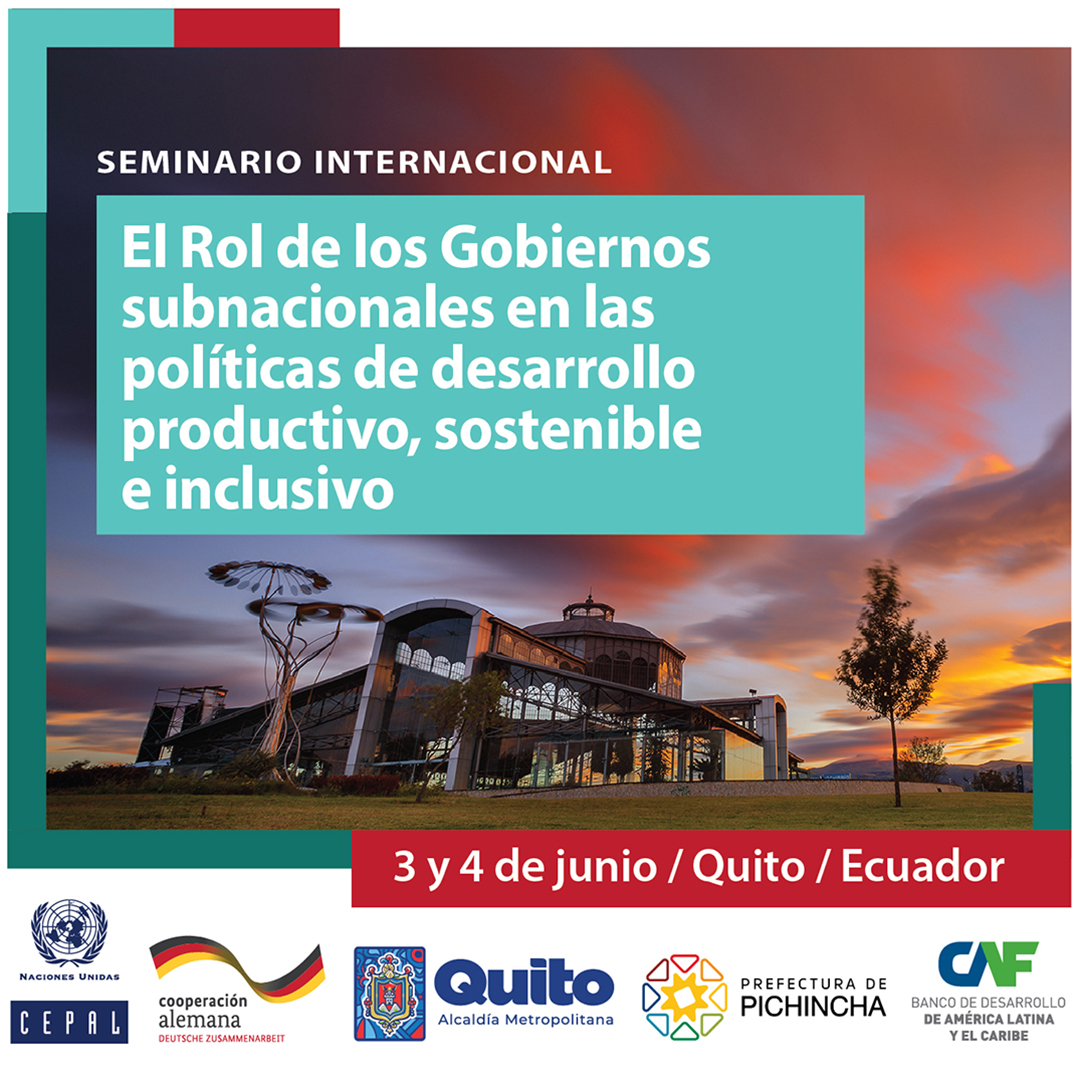Network of Subnational Governments for Productive Development in Latin America and the Caribbean Officially Launched During Meeting in Ecuador
Work area(s)
The platform, with ECLAC serving as Technical Secretariat, aims to foster dialogue, the exchange of good practices, cooperation, and the development of joint projects focused on productive transformation from the territorial level.

Authorities from Latin America and the Caribbean gathered in Quito, Ecuador, today to establish the Network of Subnational Governments for Productive Development in Latin America and the Caribbean. Conceived as a permanent technical and political space, the Network seeks to support the strengthening of subnational governments’ capacities in designing and implementing productive development policies.
The Network’s creation, formalized through the Pichincha Declaration, was one of the outcomes of the International Seminar: The Role of Subnational Governments in Sustainable and Inclusive Productive Development Policies, held on Tuesday, June 3, and Wednesday, June 4, 2025, in the Ecuadorian capital. The event was organized by the Economic Commission for Latin America and the Caribbean (ECLAC), the Prefecture of Pichincha, and the Municipality of Quito, with support from German Cooperation (GIZ) and CAF—Development Bank of Latin America and the Caribbean. The Network aims to stimulate dialogue, the sharing of good practices, cooperation, and the development of joint initiatives for productive transformation from the ground up.
The signatories expressed their gratitude to ECLAC for its support in creating and developing the Network and requested that the institution continue providing technical assistance, facilitating dialogue and agreements among subnational governments, and serving as its Technical Secretariat.
The event was inaugurated on Tuesday, June 3, by Paola Pabón, Prefect of Pichincha; Pabel Muñoz, Mayor of Quito; Javier Medina Vásquez, Acting Deputy Executive Secretary of ECLAC, representing Executive Secretary José Manuel Salazar-Xirinachs; Carlos Mohr, Director of the GIZ project “Productive, Ecological and Socially Just Economic Transformation in Latin America and the Caribbean” (virtually); and Inka Mattila, Acting UN Resident Coordinator in Ecuador.
“Subnational governments are key actors. We have the knowledge and the will, but we need to strengthen our competencies, secure financing, and establish governance that recognizes our role,” stated Paola Pabón during the opening ceremony. She celebrated the launch of the Network, describing it as “a milestone not only for Pichincha and Ecuador but for all of Latin America and the Caribbean.”
ECLAC’s Acting Deputy Executive Secretary emphasized that it is imperative for countries and territories in Latin America and the Caribbean to scale up and improve their productive development policies to escape the low-growth trap. “We are convinced that much of the action around productive development must take place at the local level, with local actors, from subnational levels. We urge that deep territorial productive development agendas be worked on throughout our continent, based on recognizing the differences and potential that these localities possess to drive more sustainable and inclusive development,” stated Javier Medina Vásquez.
He highlighted several initiatives ECLAC has been undertaking with partner institutions in this area, including the Platform of Cluster Initiatives and Other Territorial Productive Linkage Initiatives (IAPT in Spanish), the 2024 launch of ECLAC’s flagship report Panorama of Productive Development Policies in Latin America and the Caribbean, and the promotion of a forum for exchange, dialogue, and cooperation among subnational governments on sustainable and inclusive territorial productive development.
Speaking virtually, Carlos Mohr of GIZ explained that the project “Productive, Ecological and Socially Just Economic Transformation in Latin America and the Caribbean” collaborates with ECLAC on issues related to social development, fiscal policy, and productive development. “We believe that, in times like these, it is very important to maintain close partnerships with countries with which we share trust and common values. German Cooperation has a long-standing relationship with ECLAC, given its regional scope, technical expertise, and mutual commitment to the Sustainable Development Goals,” he said.
Inka Mattila, Acting UN Resident Coordinator in Ecuador, also praised the “effort to create a permanent network to accelerate the exchange of ideas, solutions, and lessons among subnational governments,” and agreed that “the linkage between productive development, sustainability, and inclusion is essential to overcome the development traps — as explained by ECLAC’s Acting Deputy Executive Secretary — that our countries face in the region: low growth, persistent inequality, and weak institutions. Only through a multidisciplinary and comprehensive approach, with a holistic perspective, can we overcome these challenges.”
Finally, Pabel Muñoz, Mayor of Quito, shared the advances and challenges of the municipality he leads, highlighting ECLAC’s conceptual and technical contributions on development policies and the support received from the United Nations system and various regional multilateral organizations. “We are building a kind of conceptual paradigm on the SDGs — not at the national but local level — about the opportunities that cities, local and subnational governments have to promote development that is sustainable and productive, but above all, one that seeks equity, equality, and social justice,” he concluded.
The two-day event included the participation of authorities from Argentina, Chile, Colombia, Costa Rica, Ecuador, El Salvador, Spain, Mexico, Panama, Paraguay, and Uruguay, as well as international experts, multilateral organizations, and development banks.
Related content

Gobiernos subnacionales se reunirán en Quito para fortalecer su papel en las políticas de desarrollo productivo
Los días 3 y 4 de junio se llevará a cabo en Ecuador un seminario internacional organizado por la CEPAL, la Prefectura de Pichincha y la Alcaldía de Quito, con el apoyo de la Cooperación…
